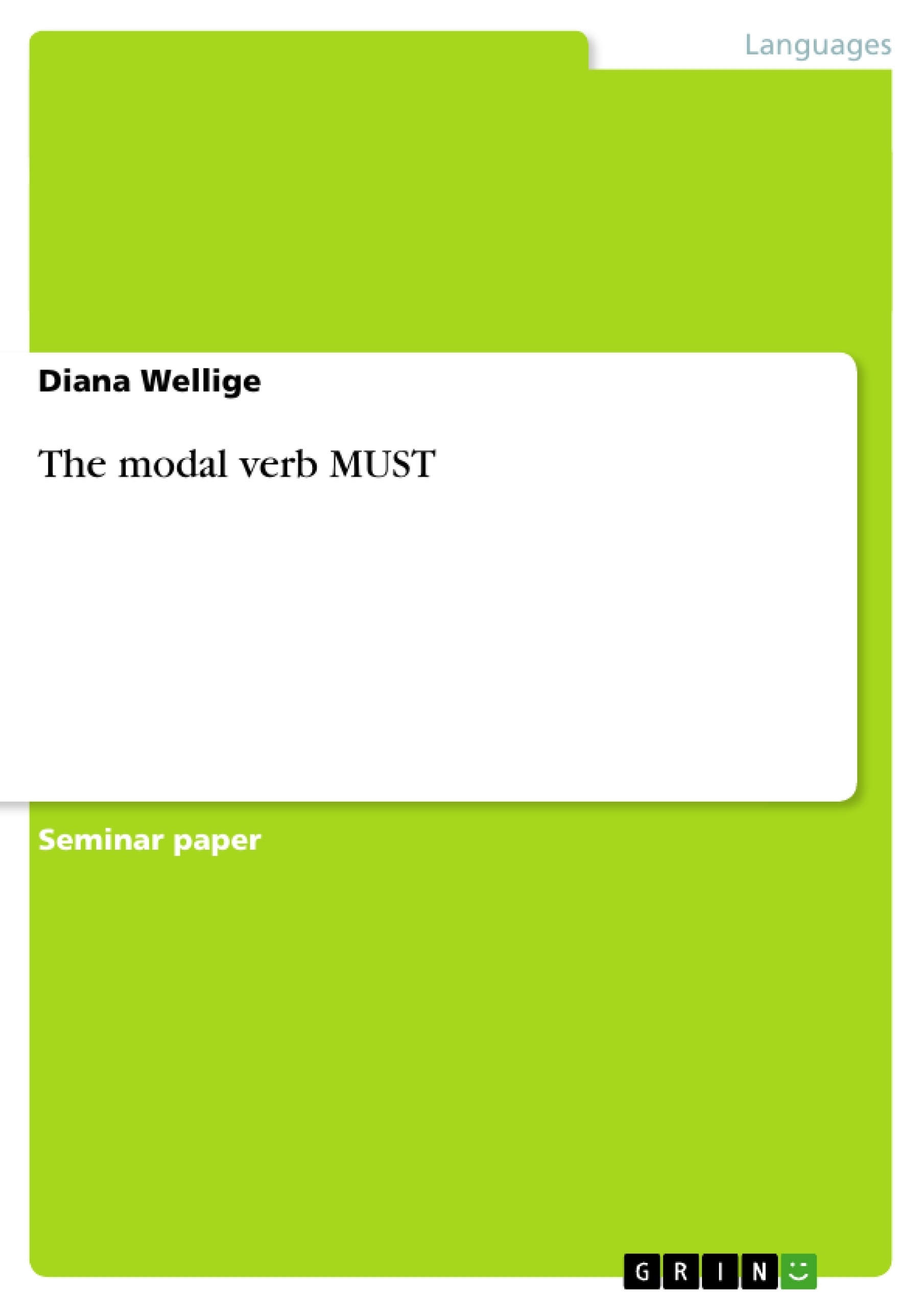Excerpt
Table of contents
1. Introduction
2. Modal verbs in general
2.1. Types of verbs
2.2. Syntax
2.3. Semantics
2.4. Characteristics of epistemic and deontic modality
2.4.1. Subjectivity and non-factuality
2.4.2. Proposition and event
2.4.3. Possibility and necessity
3. Must as a modal verb
3.1. Form
3.2. Temporal meaning
3.3. Contexts
3.4. Modal meaning
3.4.1. Obligation
3.4.2. Necessity
4. Data Analysis
4.1. Necessity
4.2. Obligation
5. Conclusion
Bibliography
1. Introduction
This paper deals with the task of modality, especially the modal verb must. The roots of modality can be found in the classical Greek philosophy. Modality “derived from the fact that human beings often categorize their attitudes and experience in terms of the way things might or must be, or might have been or must have been.”[1] So modal verbs are fundamental in everyday life, they are used in every conversation. With modals one can construct a possible world that differs from the actual world a lot.
2. Modal verbs in general
2.1. Types of verbs
Modality is always connected to the meaning of verbs. Verbs can either have a factive or a non-factive meaning. Verbs with a factive meaning are for example: swim, walk, catch and sleep. They are called lexical verbs. Verbs with a non-factive meaning are for example auxiliary verbs like do, have and be and the modal verbs this term paper is about. Modal verbs are: can, could, may, might, must, will, would, shall, should, ought and need (need can also be used as an ordinary non-auxiliary verb).
Lexical verbs are used to talk about things which definitely happened or are definitely happening. One can clearly say whether these things happened or not, whether they are true or false.
- He is walking down the street.
- She likes to play soccer.
It is not that easy with modal verbs. They are used to express that things are expected to happen or that events are possible, necessary, improbable or impossible. They are also used to say that things did not happen or that one is not sure whether they happened.
- Laura must be in Tokio.
- I may come tomorrow if I have time.
2.2. Syntax
Modal verbs can also be called defective verbs considering syntax because they have NO
- third person “s”-morpheme (Not: *He musts do that.);
- passive forms (Not: *I was must to go home.);
- imperatives (Not: *Can!, *Must!);
- infinitives - other expressions are used instead when necessary (I´d like to be able to skate. ® Not: *I´d like to can skate.);
- “infinitive with to” when they are followed by other verbs (Not: *He must to be home by nine o´clock.);
- “do”-support for negation and questions (Can your mother drive?, You needn´t look at me like that.);
- past forms or participles – other expressions are used instead (I had to go to Berlin yesterday. ® Not: *I must go to Berlin yesterday. or *I musted go to Berlin yesterday.).
There exists no co-occurrence with modal verbs (*You may should come home now.) and modal verbs are always followed by the bare infinitive.
2.3. Semantics
In contrast to lexical verbs, modal verbs have a more context-dependent meaning. While the meaning of lexical verbs is more fixed, with modals you have to have a closer look at the context to understand what is meant by them in several contexts.
The meaning of modal verbs can be divided into two sections again – the epistemic and the non-epistemic level.
The non-epistemic level is also called “intrinsic modality” or “deontic modality” and can again be divided into two types. First I am going to talk about “deontic modality”. It involves some intrinsic human control over events. It says that actions can be influenced by giving permission and imposing an obligation to do something in the future. So deontic modality is about permission, obligation and volition given by modal verbs. One can´t say that deontic modality is speaker-orientated because sometimes not the speaker is the deontic source but the adressee. So linguists say that deontic modality is discourse-orientated.
® You must be here by 8 o´clock at the latest.
This example shows that not the speaker is obliged to do something but he obliges the adressee to do something.
The second type is known as “dynamic modality”. It says that somebody is physically able to do something. The dynamic usage of modal verbs is subject-orientated. That means that the “subject´s ability or willingness is at issue, not the speakers attitudes or opinions.”[2]
- James can drive a car.
The epistemic level of modality is also called “extrinsic modality” or “epistemic modality”. It is concerned with matters of knowledge or belief on which basis speakers give judgements about the probability of the truth of a proposition, whether it is or is not likely to happen. So it is connected with reality. Epistemic modality is always speaker-orientated, it depends on the speaker´s attitude towards something and shows his or her subjective view of the world. Possibility, necessity and prediction are expressed by epistemic modality. ® There´s the doorbell. It must be Jamie.
While analysing data one always has to keep in mind that epistemic modality entails non-epistemic modality but not vice versa. That means all examples express necessity and only some of them even obligation.
2.4. Characteristics of epistemic and deontic modality
Deontic and epistemic modality differ in several aspects I am now going to have a closer look at.
[...]
[1] Hoye, Leo (1997): Adverbs and modality in English. Harlow: Longman
[2] Hoye, Leo (1997): Adverbs and modality in English. Harlow: Longman
- Quote paper
- Diana Wellige (Author), 2005, The modal verb MUST, Munich, GRIN Verlag, https://www.grin.com/document/40716
Publish now - it's free






















Comments